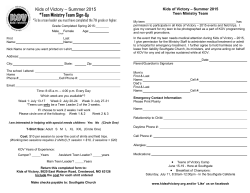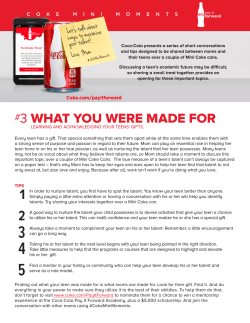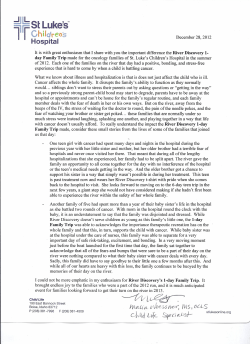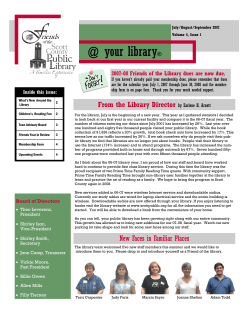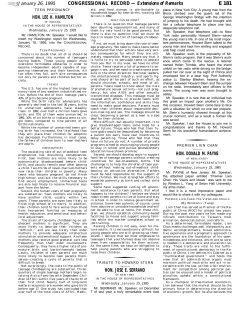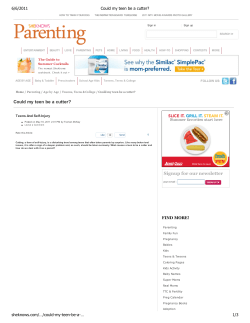
FACT SHEET – Executive Overview: Teen Challenge Training Center,...
FACT SHEET – Executive Overview: Teen Challenge Training Center, Inc. Contact Information: Joseph S. Batluck, Sr., D.Min., Executive Director Chaplain (Colonel) U.S. Army-Ret – joe.batluck@teenchallengetc.com; 717.933.4181 x1102 Joel Jakubowski, CADC, CIP, CAI, CRS - joel@lancastertc.com; 484.338.4886 Description: Teen Challenge Training Center, Inc. (TCTC) is a faith-based, adult, long-term, residential, state-licensed rehabilitation program for men and women struggling with chemical addiction. Credentials: Teen Challenge is credentialed by Teen Challenge U.S.A. located in Springfield, MO and by the Pennsylvania Department of Health, Department of Drug and Alcohol Programs (DDAP). It is registered with the IRS as a religious, non profit 501(c)(3). Vision: To be the foremost solution for sustainable, life-changing restoration of those struggling with life controlling problems, resulting in productive members of the church and community. Mission: Teen Challenge is the home of the faith-based recovery program where lives are changed. We are committed to: rekindling hope, renewing life, and restoring families by reaching out to men, women, and youth struggling with life-controlling problems History: Rev. David Wilkerson traveled to New York City in 1958 to intercede in court for six gang members, all teen age boys, on trial for murder and drug related charges. This intervention resulted in many gang members embracing the Gospel message and experiencing a changed life. Scope: TCTC Inc. operates 8 centers in PA, NY and NC with nearly 400 students. The TC-USA mission includes an international program with nearly 208 centers in the U.S., 960 overseas and standing requests from 31 countries to open new centers. The national office is located in Springfield, Missouri. Instruction: Phase 1: Two crisis/referral centers are the portals through which many men enter the program. These centers serve men who are in dire need of housing while their admission packet is processed. The primary men’s 14-month program is composed of two phases. The first phase is a four month program at an induction center in Buffalo, NY; Syracuse; NY; Pittsburgh, PA; Philadelphia, PA or Carthage, NC. - Phase 2 is ten months and is located at the corporate headquarters in Rehrersburg, PA. An adapted version of the 12-step program is complimented by Bible study, and community service as part of the curriculum. A state-licensed G.E.D. program is available for students that did not complete high school. Students must be at least 17 ½ years old upon admission. The women’s program is a 12-month program conducted in one location in Philadelphia. Both programs are similar in content. Average enrollment is 150 for phase one and 200 for phase two of the men’s program and 20 for the women’s program. NEW MAN work force development training: A four month training program is embedded in Phase 2 where students learn: (1) Marketable job skills (2) Integrating work and faith-based values (3) Interviewing and resume-building techniques (4) Personal financial management ESL students: We can accommodate students who primarily speak Spanish. Bilingual teachers will be available and English classes will be required. Outreach teams: Each student is required to participate in an outreach team during their time in the program. Opportunities include: prison, street evangelism, choir, chapel assistant, tutoring, Stay Sharp (high school), community service, to name a few. Stay Sharp: is a high-impact, youth-focused, dynamic, and contemporary, audio/visual program purposed to help middle and high school students make healthy choices regarding drugs, alcohol, and promiscuity. It has been presented across PA in public and private schools, community centers and churches with positive results. More info is available on the website: http://www.staysharp.us/ Funding: 75% of all funding is donated. 25% is raised through services rendered. Students, family members or friends are expected to only pay a $750 application fee upon admission, plus $100 “return fee” for the trip home. For students being processed through the Harrisburg Crisis and Referral Center that require (1) Transportation (2) Crisis housing or (3) Physical exam an additional $250 is required. 88% of every dollar goes to programming. The program is funded 35% by donors; 30% by churches/businesses; 30% earned. The cost per student of $20,100 is donated by individuals, churches, and corporate sponsors. Success rate: Two independent university studies and one government white paper (see footnotes) verify the success rate as 78%. Success is defined when 5-7 years following graduation a student is: drug free, employed, has a positive relationship with his family and is a productive member of a local church and the community. Graduate program: Upon graduation students have the option of applying for a limited number of seats in the Graduate Training Program. This program consists of three levels: Level 1 is EXTENDED TRAINING and requires a six month commitment. Level 2 is INTERN and requires a twelve month commitment. Level 3 is APPRENTICE and requires a twelve month commitment. Leadership responsibilities increase with each level as well as spiritual growth/discipleship opportunities. A stipend accompanies levels 2 and 3. Pre-sentencing: Approximately15% of the student population is referred to Teen Challenge in lieu of incarceration. Jurisdiction/Supervision is routinely transferred to the local county with weekly visits by the assigned parole officer. Currently Berks County parole officers specifically supervise assigned individuals. Teen Challenge staff representatives are available for court appearances as requested. Prisoner Re-Entry: Teen Challenge offers men a two-part re-entry program. The first part provides training and rehabilitation for incarcerated individuals struggling with drug and/or alcohol addiction. Successful completion of the 14-month program affords access to a re-entry house where employment, counseling and group-support are offered in a wholesome living environment. Parole/Probation Officers are welcomed and encouraged to visit parolees. Easy access is afforded with a confidential counseling area being available. State Probation Officer on site regularly. Family Addictions Resources Forum A free, 90-minute community presentation by addiction providers which will provide individuals and families (especially those currently struggling with addiction) a variety of treatment and recovery resources and options. Addictions organizations will be on hand to provide guidance. Counseling Chapel Community Service Class Chores 1. 2. 3. 4. 5. 6. Roger D. Thompson, University of Tennessee (1994). “Teen Challenge of Chattanooga, Tennessee: Survey of Alumni.” Teen Challenge National: Springfield, Missouri. Aaron Bicknese, Ph. D. Northwestern University (1999) “The Teen Challenge Drug Treatment Program in Comparative Perspective.” Research Topic White Paper #6 - http://www.unlimitedloveinstitute.com – click on Publications – Click on Research White Papers – Click on The Sociological Study of Faith-Based Communities, etc. A position paper written for Teen Challenge USA (1992) “The Therapeutic Model” Services Research Report, National Institute on Drug Abuse, U.S. Dept. of Health, Education & Welfare Public Health Service. (1976) “An Evaluation of the Teen Challenge Treatment Program” Catherine B. Hess “In God We Trust - Faith-Based Organizations and the Quest to Solve America’s Social Ills” Lewis D. Solomon (2003) 082214
© Copyright 2025






